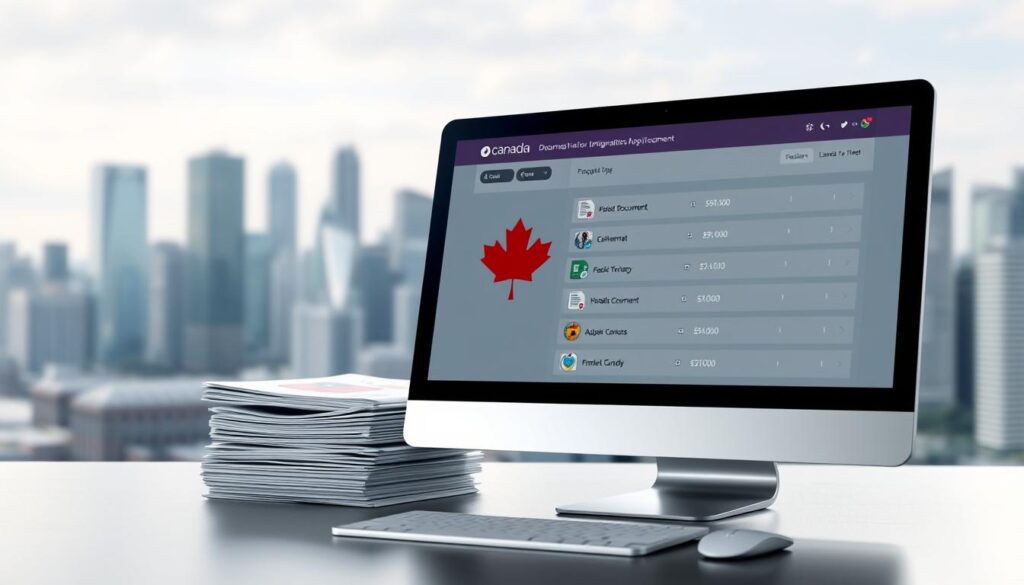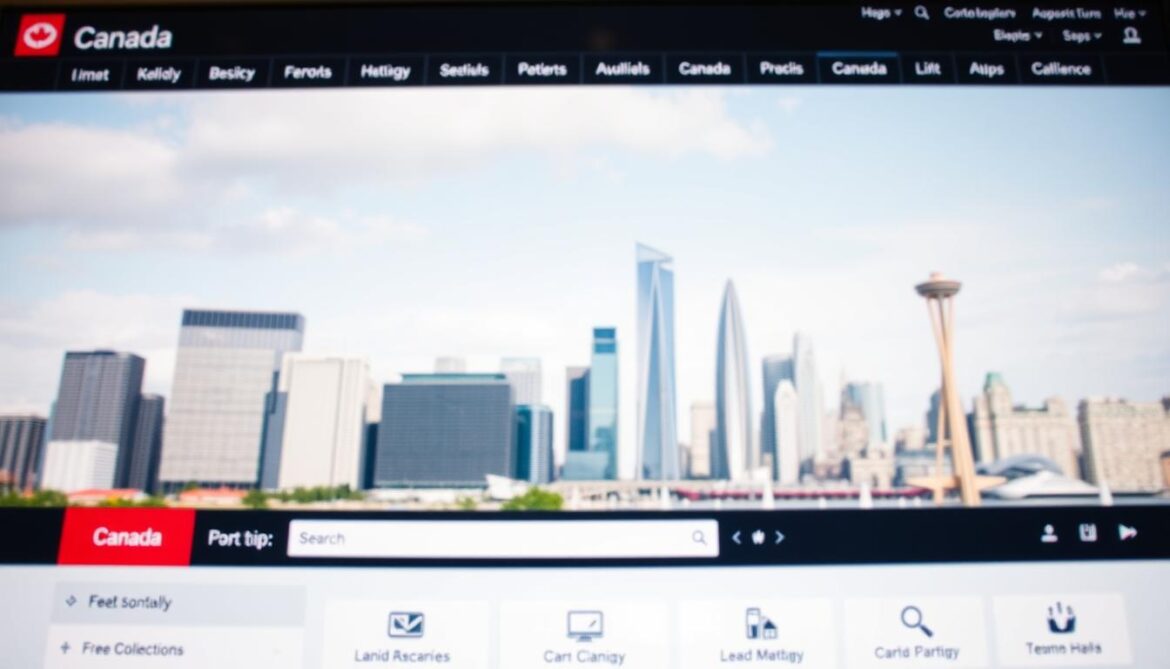Did you know over 99% of Canadian immigration applications are now submitted online? Since 2021, Immigration, Refugees and Citizenship Canada (IRCC) has shifted nearly all processes to digital platforms, transforming how people pursue opportunities in the country. This change affects everyone – from individuals applying independently to legal professionals assisting them.
The system separates applicant and legal representative access, ensuring clarity and security. While applicants use one interface, authorized professionals like lawyers work through a dedicated portal. Both platforms sync data but limit visibility to protect privacy.
IRCC updates these tools frequently to streamline processes. Recent adjustments include simplified document uploads and real-time status tracking. Exceptions for paper submissions exist only in rare cases, such as accessibility needs due to disabilities.
Key Takeaways
- Canada’s immigration system now operates almost entirely online
- Separate portals exist for applicants and legal professionals
- Paper applications are only accepted with special accommodations
- Platform updates occur regularly to improve functionality
- Authorized representatives have distinct login credentials
Understanding the Permanent Residence Process in Canada
Canada offers multiple pathways to establish long-term roots through various immigration streams. Choosing the right option depends on your skills, family connections, and personal circumstances.
Exploring Your Pathway Options
Economic programs help fill labor market needs across provinces. The table below shows key opportunities:
| Category | Key Programs | Target Group |
|---|---|---|
| Economic | Provincial Nominee, Agri-Food Pilot | Skilled workers & entrepreneurs |
| Family | Spouse/Partner Sponsorship | Immediate relatives |
| Special Cases | Humanitarian Programs | Protected persons |
Quebec operates separate streams for investors and self-employed professionals. Rural regions like Atlantic Canada have specific initiatives to attract newcomers.
Why Precision Matters
One missing document or incorrect date can delay processing by months. Authorities cross-check every detail against multiple databases.
The Immigration and Refugee Protection Act imposes strict penalties for errors. Even unintentional mistakes could lead to 5-year entry bans. Always double-check:
- Employment dates match tax records
- Family relationships align with legal definitions
- Financial statements meet exact requirements
Program rules change frequently. Last year’s eligibility criteria might not apply today. Bookmark official government pages for updates.
Navigating the permanent resident representative portal
Establishing secure access to Canada’s immigration system begins with proper account setup for legal professionals. This streamlined process ensures authorized representatives manage client files efficiently while maintaining strict confidentiality standards.

Creating Your Professional Profile
Start by visiting the OINP e-Filing Portal. Select ‘New Representative’ if this is your first time using the system. Enter your legal name and work email address exactly as registered with licensing bodies.
| Step | Action | Key Details |
|---|---|---|
| 1 | Portal Access | Use official government links only |
| 2 | Account Type | Choose ‘Representative’ category |
| 3 | Verification | Match credentials with professional records |
Secure Login Procedures
The system redirects you to My Ontario for identity confirmation. New users click ‘Sign up now!’ to establish login credentials. Create a strong password combining uppercase letters, numbers, and special characters.
After profile submission, you’ll reach a dashboard showing active cases and submission deadlines. Enable two-factor authentication for added security when handling sensitive client data. Update your contact information immediately if your email address changes.
How to Appoint and Collaborate with an Authorized Representative
Choosing the right professional to handle your immigration case requires understanding strict legal guidelines. Canada’s system only recognizes licensed experts who meet specific qualifications under provincial laws.

Criteria for Authorized Representatives
Licensed professionals fall into three categories:
- Ontario-licensed lawyers in good standing with the Law Society
- Lawyers authorized to practice in Ontario from other Canadian provinces
- Accredited members of the College of Immigration Consultants
Unlicensed advisors cannot legally charge fees. Verify credentials through official regulatory body websites before proceeding.
Ensuring Proper Appointment Procedures
You control the appointment process through your online account. Follow these steps:
- Log into your profile using secure credentials
- Locate your unique file number in the dashboard
- Select the ‘My Representative’ section
- Enter your chosen professional’s verified details
Self-appointment by representatives violates Ontario law. Always confirm submissions through your personal account to maintain full oversight of your case.
Managing Your Application and Uploading Documents Online
How do you ensure your Canadian immigration documents meet exact requirements? The system requires careful organization and real-time monitoring. Let’s break down how to handle forms and track progress effectively.

Uploading Required Forms and Support Documents
Spousal sponsorship applications showcase the process. You’ll handle:
- Physical documents: Sign and upload forms like the Sponsorship Agreement
- Digital forms: Enter details directly into fields for Background Declarations
| Submission Type | Examples | Action Required |
|---|---|---|
| Upload Signed | Application to Sponsor | Scan & attach PDF |
| Online Entry | Family Information Form | Type responses in portal |
Supporting materials like marriage certificates get uploaded through the document management tab. Clients can download all files later for personal records.
Tracking Application Progress and Updates
Your dashboard displays real-time updates:
- Percentage of completed forms
- Missing signature alerts
- Review stage notifications
The IMM 5669 declaration requires both electronic signatures. Representatives initiate the form, then clients confirm details before final submission. Set calendar reminders for time-sensitive steps like medical exam deadlines.
Protecting Your Email and Personal Information
Your email account holds the keys to your Canadian immigration journey. Security starts with maintaining full control over your profile details and login credentials. One wrong move could lock you out of critical updates or invalidate your application.

Using Your Personal Email for Registration
Always use an email address only you can access. The system links all communications to this account, including approval notices and document requests. Representatives cannot create profiles for clients or use their own contact details.
Invalid registrations occur when someone else sets up your account. Ontario automatically withdraws these applications. You’ll lose your place in processing queues and face delays of 6-12 months.
Keep your password secret – even from trusted advisors. Government agencies can’t reset credentials if you forget them. Follow these security steps:
- Change passwords every 90 days
- Enable login alerts for suspicious activity
- Use unique phrases mixing letters, numbers, and symbols
Double-check your name and phone number during setup. Mismatches between your profile and official IDs could trigger fraud reviews. Update contact details immediately if your information changes.
Troubleshooting and Technical Assistance for the Portal
When systems fail to cooperate, knowing the right troubleshooting steps becomes critical for maintaining application momentum. Technical glitches can disrupt timelines, especially when working with tight deadlines for programs like the Provincial Nominee Program.

Resolving Login and Access Issues
Encountering errors? Submit a detailed webform immediately. Include:
- Full-screen screenshots showing error codes
- Your file number from the application dashboard
- Exact time stamps of when issues occurred
Applicants outside Canada must file separate reports through their accounts. Representatives cannot submit technical requests on behalf of clients – each party handles their own portal profiles.
Desktop computers work best for complex forms. Mobile devices often display menus incorrectly, causing missed fields. Bookmark the official portal page to avoid outdated links during updates.
For repeated login failures, clear your browser cache or try alternative browsers like Firefox. Sync frequently with collaborators to ensure everyone sees the latest application changes. Save draft versions hourly to prevent data loss during unexpected timeouts.
When navigation confuses clients, screen-sharing tools help representatives guide them through tricky sections. Schedule joint review sessions to tackle tedious form checks efficiently. Always keep backup copies of submitted documents offline.
Conclusion
Navigating Canada’s digital immigration system requires attention to detail and proper guidance. Every step matters – from selecting the right program to submitting error-free applications. The online tools simplify complex processes but demand careful handling of sensitive data.
Authorized professionals play a vital role in ensuring compliance with evolving regulations. They help interpret requirements and submit applications efficiently while keeping you informed. Always verify credentials before granting access to your account.
Stay proactive by monitoring updates through official channels. Bookmark key resources and set reminders for deadlines. Protect login details like passports – they control access to your future in Canada.
With preparation and the right support, you can confidently manage your journey through Canada’s immigration pathways. Double-check every entry, keep backups, and act promptly on requests to maintain momentum.



